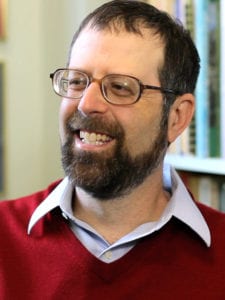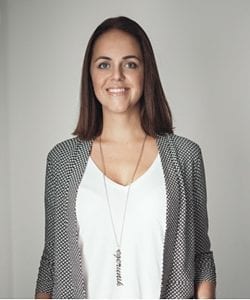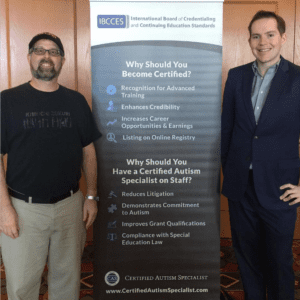 IBCCES Board Member Dr. Stephen Mark Shore rang in Autism Awareness on the Nasdaq bell Thursday, April 6 to celebrate April’s Autism Awareness Month. Congratulations Dr. Shore!
IBCCES Board Member Dr. Stephen Mark Shore rang in Autism Awareness on the Nasdaq bell Thursday, April 6 to celebrate April’s Autism Awareness Month. Congratulations Dr. Shore!
APR
 IBCCES Board Member Dr. Stephen Mark Shore rang in Autism Awareness on the Nasdaq bell Thursday, April 6 to celebrate April’s Autism Awareness Month. Congratulations Dr. Shore!
IBCCES Board Member Dr. Stephen Mark Shore rang in Autism Awareness on the Nasdaq bell Thursday, April 6 to celebrate April’s Autism Awareness Month. Congratulations Dr. Shore!
 By Donna Sigurðardóttir, founder of I am UNIK
By Donna Sigurðardóttir, founder of I am UNIKMy daughter’s future is bright. She is thriving at school because they are meeting her every need with an admirable flexibility, thoughtfulness and respect. All of which has been achieved with close cooperation between home and school, something that I believe are key factors in improving a child’s quality of life. Why? Because, on one hand we have the child’s parents, who are experts in the child and on the other hand we have the teacher, which is an expert in teaching methods and goal setting. When these two respect each others roles and take the time to listen and work together, magic happens!
Our teacher’s mentality is priceless. They have so much respect for my daughter and they put every effort in customizing her curriculum and learning environment to her needs. As an example I could mention that she always arrives late for school. Is that okay? Imagine this; she arrives into an empty school building and is exposed to minimum sensory input, which means that her stress levels are low and she gets a good start of the day. Otherwise it would take her teachers about an hour to unwind her after a chaotic school start and a maximum sensory input. That kind of a solution requires flexible thinking and caring.
 By Kerry Magro, Self-Advocate, National Speaker, and Author
By Kerry Magro, Self-Advocate, National Speaker, and AuthorI’ve written many articles about how the lack of having a peer role model growing up on the spectrum affected me. I didn’t know about Dr. Temple Grandin and others who had autism that I could look upon to show me how far I could go. As I reached adulthood though I learned about advocates such as Dr. Grandin, Carly Fleischmann, Alexis Wineman, John Elder Robison, Amy Gravino, Jesse Saperstein, the list goes on and on.
One person though who I particularly look up to is none other than international speaker Dr. Stephen Shore. Stephen Shore is not only a dear friend but also one of the biggest role models I currently have in my life.
 When I first met Stephen it was at an Autism Society of America conference. He immediately befriended me and wanted to get to know me better. After our first meeting I’d go on to read several of his books and later would be able to contribute a chapter to a book he co-authored called College for Students with Disabilities: We Do Belong. I to this day use his quote “if you’ve met one individual with autism, you’ve met one individual with autism” in a majority of my presentations. It shows how wide and unique our spectrum truly is.
When I first met Stephen it was at an Autism Society of America conference. He immediately befriended me and wanted to get to know me better. After our first meeting I’d go on to read several of his books and later would be able to contribute a chapter to a book he co-authored called College for Students with Disabilities: We Do Belong. I to this day use his quote “if you’ve met one individual with autism, you’ve met one individual with autism” in a majority of my presentations. It shows how wide and unique our spectrum truly is.
Another quote which I enjoy from Stephen is on his website where he mentions the “unlimited potential for people on the autism spectrum.” What a wonderful message. I think that’s something our entire community wants to see for our loved ones.
Now even years later it’s been astonishing to see how many times our paths have crossed. Although we are only a trade ride away from each other, me being from New Jersey and Stephen teaching in New York at Adelphi University, we still end up running into each other around the world speaking at different events. Most recently, our paths even crossed at ISCRD 2017 hosted by IBCCES in St. Augustine, Florida.
 By Kerry Magro, Self-Advocate, National Speaker, and Author
By Kerry Magro, Self-Advocate, National Speaker, and AuthorSomeone once said that ‘sarcasm is a metric for potential.’ Often at times though this is one of the hardest struggles for those with autism growing up.
A lack of sarcasm is often one of the most common characteristics of struggling with an autism diagnosis along with things such as social and communication issues, difficulties reading body language, using different tones in their voices and many more.
I remember as a young boy on the spectrum in computer class and hearing a joke that I didn’t find funny. It was a sarcastic joke by our teacher and while everyone else in the class laughed I was there completely blank. A girl looked at me after the joke had stopped like I had three heads.
 By Carol S. Weinman, Esq., Autism Legal Specialist
By Carol S. Weinman, Esq., Autism Legal Specialist
What better time to initiate a conversation about encounters with the criminal justice system than during Autism Awareness Month in April? While it may be well known that many individuals with Autism Spectrum Disorder (ASD) are victimized and bullied, it often comes as a surprise to learn that individuals with ASD are increasingly finding themselves detained in the back of a police wagon or seated in a courtroom at the defendant’s table. That’s why the demand for education and awareness on this timely topic is greater than ever before.
By Rachel Wise, CAS
As a school psychologist, I often hear parents asking what happened to the Asperger’s diagnosis? Asperger’s still exists, it just falls under a different name.
In the Diagnostic and Statistical Manual of Mental Disorders, Fourth Edition (DSM-4), there were four separate diagnoses all related to autism, which fell under a broader category called Pervasive Developmental Disorder (PDD). These four separate diagnoses included autistic disorder, Asperger’s disorder (also referred to as Asperger’s Syndrome), childhood disintegrative disorder, and pervasive developmental disorder, not otherwise specified (PDD, NOS).